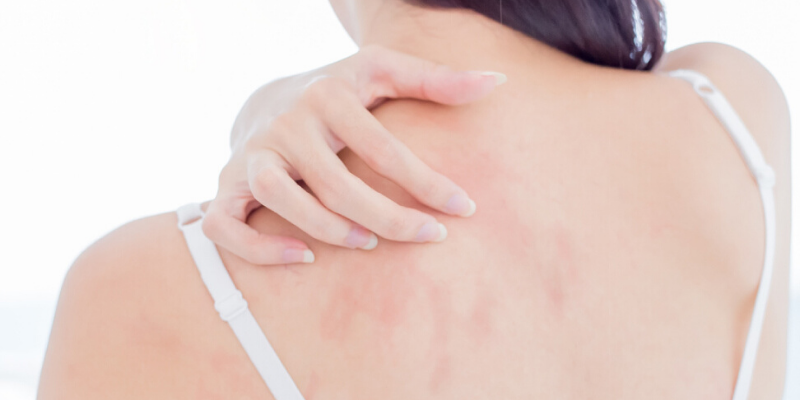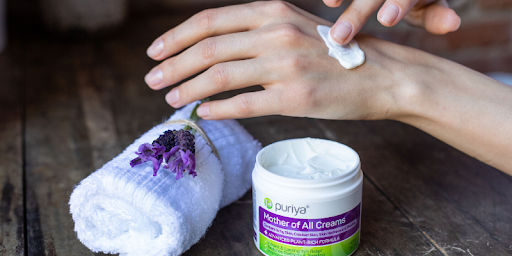

Eczema, also known as atopic dermatitis, is often the cause behind rough patches and inflamed, blistered skin. Prevalent especially during winter months when cold temperatures and dry air can dehydrate skin, eczema afflicts over 35 million Americans every year. Those who struggle with painful, inflamed, over-dry conditions deserve to have their eczema questions answered, and rightfully so. That’s why we’ve compiled popular eczema FAQs: to soothe your burning questions and burning skin alike.
1. What causes eczema?
That’s an excellent question, without a definitive answer. Many dermatologists and skin experts are today still baffled by what may or may not be the root of eczema.
There are many theories:
1) Eczema may be a genetic condition, particularly in families with a disposition toward allergies or asthma.
2) Eczema may stem from an allergic reaction to the foods you eat.
3) Eczema may be the culmination of a lack of hydration in the body.
4) Eczema could be the prolonged result of stress
5) Eczema could be the result of overexposure to chemicals in beauty products, cleaning supplies, and the like.
When you’re experiencing symptoms of an eczema flare-up, many doctors suggest taking a thorough inventory of your daily activities. Are you eating inflammatory meals, such as highly processed or histamine-releasing foods? Have you been using an irritating body wash? Are you taking steps to hydrate your skin, both inside and out? If you have a better understanding of the causes of your eczema, you’ll be better equipped to win the battle against it. Which leads us into our next question…
2. Can Eczema be cured?
No tried-and-true, unfailing cure exists for eczema, but there are many methods proven to soothe eczema. Take Puriya’s Mother of All Creams, for example. Rich in plant-based ingredients, this dry skin cream might just be the answer to your prayers. It contains no harmful, eczema-triggering chemicals, is gentle enough to be applied frequently to the skin, and has helped more than 300,000 households soothe inflamed, itchy, red spots of skin.

Keeping an eye on the foods you eat will allow you to gain back your healthy, hydrated skin! Antioxidant-rich and anti-inflammatory vitamins help your skin by attacking eczema from within; pair natural remedies with our Mother of All Creams, to help turn the tides in your fight against eczema.
3. Is eczema contagious?
No, eczema cannot be spread from one person to the next. However, eczema can spread across different parts of the body, depending on how and when your immune system reacts to the conditions causing irritation. For example, if you frequently use a shampoo containing dangerous sulfates and parabens (chemicals associated with drying out the skin), you might end up with eczema on your scalp, as well as your hands, given that both came into contact with the chemicals.
This example has a simple remedy: switch your shampoo! Toss out those harmful chemicals and opt for something with a more balanced PH, as well as clarifying ingredients such as botanical extracts of arnica, sage, rosemary, and tea tree oil. Puriya offers a Scalp Clarifying Shampoo and Conditioner, with a pleasant scent and soothing properties to match. You’ll find relief for your dry scalp that other products could only dream of providing.
4. How do I know if I have eczema?

Eczema is generally self-diagnosable, as many times it will manifest on the arms or behind the knees. The skin can demonstrate sensitivity in a variety of ways: dryness and sensitivity, red and swollen/inflamed patches, severe itching, crusting or oozing, discoloration and overall discomfort. You will notice the discomfort and the discoloration eczema causes quickly, but don’t be as quick in trying to scratch the irritating itch. Referred to as the itch-scratch cycle, your innate reaction to scratch the angry patches of skin will only make matters worse. To avoid inadvertently causing bleeding, stop the burning sensation with a cream, a much more gentle approach to lasting skin relief.
5. Who can get eczema?

Eczema can affect almost anyone, from babies to adults, from people with a history of eczema to those who’ve never before experienced it. For babies, eczema typically appears on the face, particularly on cheeks and chin, as well as the scalp and forehead. However, children tend to exhibit fewer signs of eczema as they grow older. Adults develop eczema in different areas, as mentioned above, and can sometimes suffer from the effects for years. Regardless of whether it be a child or an adult, understanding eczema’s potential causes will help you understand the best treatment. Often, simply hydrating and moisturizing your body can bring much needed relief to the skin.
Although eczema may have unknown factors, few people find themselves forced to just “deal with it” any longer. By exploring the potential causes for your particular type of skin, you will be able to peel back the veil in discovering the best ways of soothing those inflamed patches and bring that much needed moisture back! Whether it be a diet change or something as simple as regularly applying an effective moisturizing cream, relief is in your hands.
Tags: babies with eczema, causes of eczema, creams, dermatitis, eczema, moisturizers, moisturizers for sensitive skin, Puriya, scalp conditioner, scalp shampoo